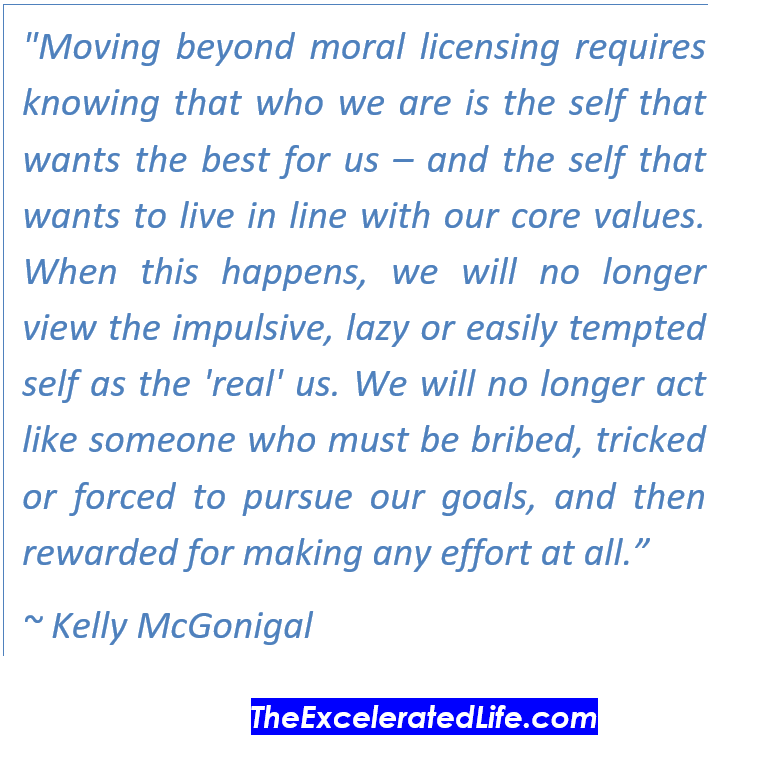Moral licensing gives you “permission” to do something “bad” after or because you’ve done something “good”. So don’t think of your actions as being “good” or “bad”. Instead, see yourself as being committed to your goal or to your self-improvement.
Good? or Bad?
Suppose you decide to exercise more. You plan to get up every morning and hit the gym. For three days, you’re there when the doors open. On the fourth day, you decide you need a rest and so you sleep in. Do you think that you’ve been “good” on the days you exercised and “bad” when you didn’t? Or suppose you intend to start eating a healthier diet. On Monday, you have a salad for lunch. On Tuesday, you have a salad for lunch. On Wednesday, someone brings doughnuts and you decide you deserve a treat for being “good” the last two days. So you eat a doughnut . . . maybe two. At lunch, you decide you’ve already blown your diet for the day so you order a double cheeseburger and fries.
Moral Licensing
Welcome to the world of moral licensing. “When you do something good, you feel good about yourself. This means you’re more likely to trust your impulses — which often means giving yourself permission to do something bad.” [McGonigal] In this world, doing something good makes it OK to do something “bad”, like skipping exercise or having an extra piece of cake.
Heck, you don’t even have to do the good deed, just thinking about doing good is enough. When people were asked to choose between two volunteer opportunities — but not actually sign up for service — they became more likely to splurge on a shopping trip. When some people were asked to consider donating to a charity — but not actually forking over the dough — they were more likely to treat themselves at the mall. [McGonigal]
When you moralize your behavior, you fall into the effects of moral licensing. Tell yourself you are “good” for exercising today and you’re more likely to sleep in tomorrow. Tell yourself you’re “good” for eating a salad at lunch and you’re apt to indulge in a decadent dessert at dinner. We forget our real goal and indulge ourselves as a treat for being “good”.
The Two Selves
Even making progress on our goals can be an excuse for slacking off. In all of us, there are two competing selves. One is the self that wants to improve and grow and live out your values. The other wants instant gratification and wants it now!
Your brain keeps track of these conflicting goals. When you make progress on your long-term goal, the goal-achieving part of your brain is temporarily satisfied and turns to the unsatisfied goal — self-indulgence. This is what happens when you find yourself taking one step forward and two steps back.
To get out of this trap, shift your thinking from “look how much progress I’ve made” to “look how committed I am to my goal”. This one simple change in focus leads to a different perspective: “‘I did that because I wanted to‘ not ‘I did that, great, now I can do what I really want!'” [McGonigal]
Don’t Be Good
So don’t be “good” when you take a step toward your goal and “bad” when you go in the opposite direction. Instead, think in terms of doing what you really value instead of giving in to short-term pleasure. See yourself as the person who is motivated to achieve your goals, not someone who has to be tricked or prodded to do the right thing.
Remember why you chose your goal in the first place and see your progress toward the goal as evidence of your commitment, not as a reason to indulge in behavior that takes you in the opposite direction. Don’t be good. Be committed. That is embracing the Excelerated Life™!
Excelerated willpower — becoming highly self-regulated — is one step in creating your Excelerated Life™, a life of flourishing, of well-being, meaning, and purpose.
Resources:
McGonigal, Ph.D., Kelly. The Willpower Instinct. New York: The Penquin Group, 2012


